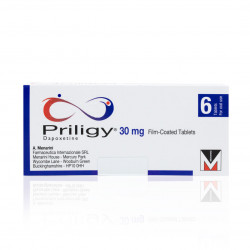Priligy (dapoxetine) Coupons, Discounts & Cost
Priligy (dapoxetine) is a drug that is used to increase potency and prevent premature ejaculation (delay and fully normalize ejaculation). One way to save money on the Priligy (dapoxetine) retail cost regardless of income and insurance status is to use Priligy (dapoxetine) coupons or discount cards from RXCoupons. Use our Priligy (dapoxetine) coupons at your online pharmacy and receive up to 75% off the sale price each time you refill your prescription.
What do you need to know about Priligy (dapoxetine)?
Priligy (dapoxetine) is a drug that is used to increase potency and prevent premature ejaculation (delay and fully normalize ejaculation). It contains dapoxetine as the active ingredient.
What do you need to know about Priligy (dapoxetine) dosage regimen?
Consult with your physician before you start taking Priligy (dapoxetine).
If you want to prevent premature ejaculation, you should take one tablet of 60 mg a day for 3 to 6 months (depending on the complexity of the disease).
If you just want to prolong sexual intercourse, take one tablet of 60 mg daily for 2-4 hours before sexual activity. Take Priligy tablets with water, regardless of the meal plan. The daily dose of the drug should not be more than one tablet per day (dapoxetine 60 mg).
Patients with impaired renal function
Patients with mild or moderate renal insufficiency may not change the dose. Priligy is not recommended for patients with severe renal impairment.
Patients with hepatic impairment
Patients with mild hepatic dysfunction may not change the dose. The drug is contraindicated in patients with moderate and severe hepatic impairment.
Patients with low CYP2D6 activity
Caution is indicated in patients with low CYP2D6 activity when increasing the dose of the drug.
Patients receiving inhibitors of CYP3A4
Concurrent treatment with CYP3A4 inhibitors is contraindicated. In some cases the dose of Priligy should be reduced to 30 mg.
What do you need to know about Priligy (dapoxetine) side effects?
Priligy can cause unwanted side effects, as well as other medications. Generally, the drug has mild side effects. The most common drug reactions include headache, dizziness.
Mental disorders: anxiety, agitation, restlessness, abnormal dreams, nightmares, depression, mood changes, nervousness, apathy, disorientation, sleep disorder, initial insomnia, bruxism, loss of libido, anorgasmia.
Central nervous system: dizziness, headache, drowsiness, impaired concentration, tremor, paresthesia, akathisia, hypersomnia.
Cardiovascular system: bradycardia, tachycardia, low blood pressure, systolic hypertension.
Respiratory system: nasal congestion.
Gastrointestinal tract: nausea, diarrhea, vomiting, constipation, abdominal pain, dyspepsia, flatulence, stomach discomfort, bloating, dry mouth.
Reproductive system: erectile dysfunction, ejaculation disorders (absence of ejaculation), orgasmic dysfunction, including anorgasmia in men.
Skin disorders: rash, itching, sweating.
Other reactions: fatigue, anxiety, high blood pressure, fast heart rate, blurred vision, mydriasis, eye pain, vertigo.
What do you need to know about Priligy (dapoxetine) overdose?
Generally, the symptoms of Priligy overdose include drowsiness, gastrointestinal disorders (nausea, vomiting), tachycardia, tremor, agitation and dizziness. Supportive and symptomatic treatment is advisable in case of overdose.
What do you need to know about Priligy (dapoxetine) contraindications?
Priligy (dapoxetine) should not be taken if you are allergic to dapoxetine, or if you have lactose intolerance, moderate and severe hepatic dysfunction, severe renal impairment, arrhythmia, or any other heart disease.
Do not use Priligy if you take MAO inhibitors, inhibitors of CYP3A4, selective serotonin reuptake inhibitors, thioridazine, and other drugs containing St. John's wort.
Priligy (dapoxetine) is contraindicated in children and adolescents under the age of 18.
Avoid Priligy therapy in case of orthostatic hypotension, mania and hypomania, bipolar disorder.
Be careful when taking the drug in the following cases:
- Mild to moderate renal impairment;
- Simultaneous therapy with anticoagulation agents and drugs affecting platelet aggregation (due to the high risk of bleeding).
Do not mix alcohol with Priligy (dapoxetine).

